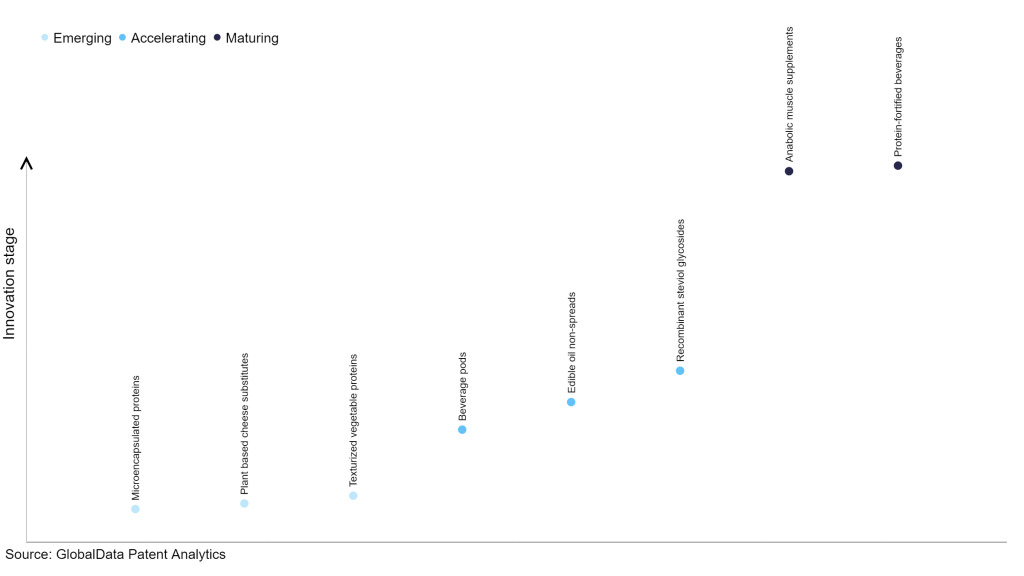The consumer industry continues to be a hotbed of patent innovation. Activity is driven by environmental sustainability, convenience, aesthetics, and the growing importance of personalized nutrition, food safety and transparency, and digital food management technologies. In the last three years alone, there have been over 52,000 patents filed and granted in the consumer industry, according to GlobalData’s report on Innovation in consumer: plant-based antioxidants. Buy the report here.

Discover B2B Marketing That Performs
Combine business intelligence and editorial excellence to reach engaged professionals across 36 leading media platforms.
However, not all innovations are equal and nor do they follow a constant upward trend. Instead, their evolution takes the form of an S-shaped curve that reflects their typical lifecycle from early emergence to accelerating adoption, before finally stabilizing and reaching maturity.
Identifying where a particular innovation is on this journey, especially those that are in the emerging and accelerating stages, is essential for understanding their current level of adoption and the likely future trajectory and impact they will have.
30+ innovations will shape the consumer industry
According to GlobalData’s Technology Foresights, which plots the S-curve for the consumer industry using innovation intensity models built on over 12,000 patents, there are 30+ innovation areas that will shape the future of the industry.
Within the emerging innovation stage, microencapsulated proteins, plant-based cheese substitutes, and texturized vegetable proteins are disruptive technologies that are in the early stages of application and should be tracked closely. Beverage pods, edible oil non-spreads and recombinant steviol glycosides are some of the accelerating innovation areas, where adoption has been steadily increasing. Among maturing innovation areas are anabolic muscle supplements and protein-fortified beverages, which are now well established in the industry.
Innovation S-curve for the consumer industry

Plant-based antioxidants is a key innovation area in consumer
Plant-based antioxidants are natural compounds found in various plant-based foods, such as fruits, vegetables, nuts, and herbs. They have the ability to neutralize harmful molecules known as free radicals, which cause oxidative stress and can lead to various chronic diseases in humans.
GlobalData’s analysis also uncovers the companies at the forefront of each innovation area and assesses the potential reach and impact of their patenting activity across different applications and geographies. According to GlobalData, there are 55+ companies, spanning technology vendors, established consumer companies, and up-and-coming start-ups engaged in the development and application of plant-based antioxidants.
Key players in plant-based antioxidants – a disruptive innovation in the consumer industry
‘Application diversity’ measures the number of applications identified for each patent. It broadly splits companies into either ‘niche’ or ‘diversified’ innovators.
‘Geographic reach’ refers to the number of countries each patent is registered in. It reflects the breadth of geographic application intended, ranging from ‘global’ to ‘local’.
Nestle is one of the leading patent filers in plant-based antioxidants. Some other key patent filers in the space include Unilever, Danone, and DSM-Firmenich. Danone North America entered into a collaboration with Brightseed, an AI-driven biotechnology firm. Brightseed has developed an AI platform tailored for the identification of phytonutrients, including antioxidants, at a molecular scale.
In terms of application diversity, Phytoption leads the pack, with Lone Star Funds and Kraft Heinz in the second and third positions, respectively. By means of geographic reach, Henan Zhongda Biological Engineering holds the top position, followed by Veg of Lund and Unilever.
There is a growing trend towards plant-based diets and a greater awareness of the health benefits associated with consuming antioxidants from plant sources. Antioxidants, which are compounds that help protect cells from damage caused by harmful molecules called free radicals, are abundant in many plant-based foods.
To further understand the key themes and technologies disrupting the consumer industry, access GlobalData’s latest thematic research report on Consumer.
Data Insights
From

The gold standard of business intelligence.
Blending expert knowledge with cutting-edge technology, GlobalData’s unrivalled proprietary data will enable you to decode what’s happening in your market. You can make better informed decisions and gain a future-proof advantage over your competitors.




